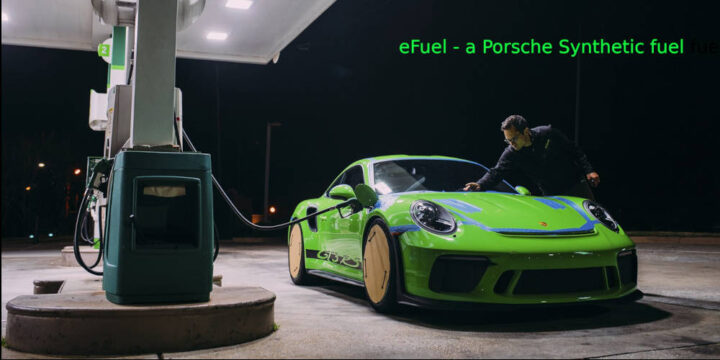
The Future of Automotive Fuel
As the world continues to seek sustainable solutions for various industries, the automotive sector has been at the forefront of developing alternative fuel sources. Among these emerging options, eFuel produced by Porsche has gained significant attention due to its potential to reduce carbon emissions and offer a greener future for transportation.

In this article, we delve into the concept of eFuel or synthetic fuel, its benefits, and its potential impact on the automotive industry.
What is eFuel?
As the name indicates, short for electronic fuel, is a synthetic fuel created through a process called power-to-liquid (PtL). Unlike traditional fossil fuels, this synthetic fuel is produced using renewable energy sources, such as wind, solar, or hydroelectric power.
The production involves capturing carbon dioxide (CO2) from the atmosphere and combining it with hydrogen derived from water through electrolysis. This chemical reaction results in a carbon-neutral fuel that can be used in conventional combustion engines.
The Benefits of eFuel
Reduced Carbon Footprint:
One of the primary advantages of synthetic fuel is its ability to significantly reduce carbon emissions. As the production process involves capturing and reusing CO2, the overall carbon footprint of its use is much lower compared to fossil fuels.
Use of synthetic fuel makes it a promising alternative for reducing greenhouse gas emissions and combating climate change.
Compatibility with Existing Infrastructure:
Another notable benefit is its compatibility with existing combustion engines and fueling infrastructure. Unlike other alternative fuels that often require significant modifications or the use of specialized vehicles, the synthetic fuel can be seamlessly integrated into the current transportation system.
This makes it a practical option for transitioning towards a more sustainable future without the need for massive infrastructure overhauls.
Energy Density and Range:
This alternative fuel offers a high energy density, which translates to a longer driving range for vehicles. This characteristic is particularly important when considering long-distance travel or areas with limited charging or refueling stations.
With this fuel, drivers can experience a similar driving range to conventional gasoline or diesel fuels, ensuring convenience and practicality.
Improved Air Quality:
As this alternative fuel burns cleaner than traditional fossil fuels, it contributes to improved air quality. Its combustion produces fewer harmful pollutants, such as nitrogen oxides and particulate matter, which are known to have detrimental effects on human health and the environment. By adopting this sustainable fuel, we can strive towards cleaner air and healthier communities.
The Potential Impact on the Automotive Industry
Chance to have an alternative holds significant implications for the automotive industry. Here are a few ways in which it can shape the future of transportation:
Transitioning Existing Vehicles:
This fuel is compatible with current combustion engines, it provides a viable option for transitioning existing vehicles towards more sustainable fuel sources. This means that drivers can continue using their conventional cars without the need for expensive modifications or purchasing entirely new electric vehicles.
Bridge to Electrification:
While electric vehicles (EVs) are gaining popularity, the widespread adoption of EVs is still a gradual process. eFuel serves as a bridge to electrification by offering a sustainable fuel option for vehicles during the transition period. This ensures a smoother and more inclusive shift towards a fully electric future.
Preserving Automotive Heritage:
Many automotive enthusiasts have a deep appreciation for classic and vintage cars. With eFuel, these beloved vehicles can continue running sustainably without compromising their historical significance. Preserving automotive heritage becomes feasible while reducing the environmental impact associated with fossil fuels.
Let us see how greener the future will be with eFuel
As we navigate the challenges of environmental sustainability and strive for a greener future, this fuel emerges as a promising solution for the automotive industry.
Its ability to reduce carbon emissions, compatibility with existing infrastructure, and positive impact on air quality make it a compelling alternative fuel to traditional fossil fuels.
Moreover, it serves as a transitional fuel option, facilitating the shift towards electrification while preserving automotive heritage.
With ongoing advancements in synthetic fuel production and adoption, we can envision a future where sustainable transportation is attainable without sacrificing convenience and performance.



